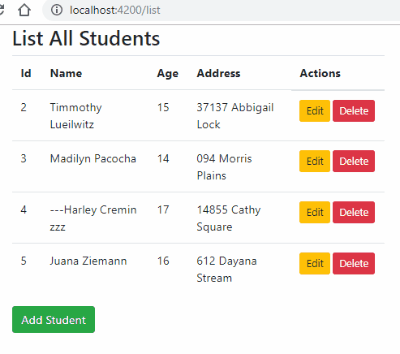Angular HttpClient는 헤더를 보내지 않습니다.
내 코드는 다음과 같습니다.
import { HttpClient, HttpErrorResponse, HttpHeaders } from '@angular/common/http';
logIn(username: string, password: string) {
const url = 'http://server.com/index.php';
const body = JSON.stringify({username: username,
password: password});
const headers = new HttpHeaders();
headers.set('Content-Type', 'application/json; charset=utf-8');
this.http.post(url, body, {headers: headers}).subscribe(
(data) => {
console.log(data);
},
(err: HttpErrorResponse) => {
if (err.error instanceof Error) {
console.log('Client-side error occured.');
} else {
console.log('Server-side error occured.');
}
}
);
}
그리고 여기 네트워크 디버그 :
Request Method:POST
Status Code:200 OK
Accept:application/json, text/plain, */*
Accept-Encoding:gzip, deflate
Accept-Language:en-US,en;q=0.8
Cache-Control:no-cache
Connection:keep-alive
Content-Length:46
Content-Type:text/plain
데이터가 '요청 페이로드'에 저장되었지만 내 서버에 POST 값이 수신되지 않았습니다.
print_r($_POST);
Array
(
)
POST 중에 설정되지 않은 헤더에서 오류가 발생했다고 생각합니다. 제가 잘못한 것은 무엇입니까?
새 HttpHeader클래스 의 인스턴스 는 변경할 수없는 객체입니다. 클래스 메소드를 호출하면 결과적으로 새 인스턴스가 리턴됩니다. 따라서 기본적으로 다음을 수행해야합니다.
let headers = new HttpHeaders();
headers = headers.set('Content-Type', 'application/json; charset=utf-8');
또는
const headers = new HttpHeaders({'Content-Type':'application/json; charset=utf-8'});
업데이트 : 여러 헤더 추가
let headers = new HttpHeaders();
headers = headers.set('h1', 'v1').set('h2','v2');
또는
const headers = new HttpHeaders({'h1':'v1','h2':'v2'});
업데이트 : HttpClient 헤더 및 매개 변수에 대한 객체 맵 수락
5.0.0-beta.6 부터 HttpHeaders개체 생성을 건너 뛰고 개체 맵을 인수로 직접 전달할 수 있습니다. 이제 다음을 수행 할 수 있습니다.
http.get('someurl',{
headers: {'header1':'value1','header2':'value2'}
});
배수 매개 변수 또는 헤더를 추가하려면 다음을 수행하십시오.
constructor(private _http: HttpClient) {}
//....
const url = `${environment.APP_API}/api/request`;
let headers = new HttpHeaders().set('header1', hvalue1); // create header object
headers = headers.append('header2', hvalue2); // add a new header, creating a new object
headers = headers.append('header3', hvalue3); // add another header
let params = new HttpParams().set('param1', value1); // create params object
params = params.append('param2', value2); // add a new param, creating a new object
params = params.append('param3', value3); // add another param
return this._http.get<any[]>(url, { headers: headers, params: params })
set http headers like below in your http request
return this.http.get(url, { headers: new HttpHeaders({'Authorization': 'Bearer ' + token})
});
I struggled with this for a long time. I am using Angular 6 and I found that
let headers = new HttpHeaders();
headers = headers.append('key', 'value');
did not work. But what did work was
let headers = new HttpHeaders().append('key', 'value');
did, which makes sense when you realize they are immutable. So having created a header you can't add to it. I haven't tried it, but I suspect
let headers = new HttpHeaders();
let headers1 = headers.append('key', 'value');
would work too.
In the manual (https://angular.io/guide/http) I read: The HttpHeaders class is immutable, so every set() returns a new instance and applies the changes.
The following code works for me with angular-4:
return this.http.get(url, {headers: new HttpHeaders().set('UserEmail', email ) });
In my legacy app Array.from of prototype js was conflicting with angular's Array.from that was causing this problem. I resolved it by saving angular's Array.from version and reassigning it after prototype load.
Angular 8 HttpClient Service example with Error Handling and Custom Header
import { Injectable } from '@angular/core';
import { HttpClient, HttpHeaders, HttpErrorResponse } from '@angular/common/http';
import { Student } from '../model/student';
import { Observable, throwError } from 'rxjs';
import { retry, catchError } from 'rxjs/operators';
@Injectable({
providedIn: 'root'
})
export class ApiService {
// API path
base_path = 'http://localhost:3000/students';
constructor(private http: HttpClient) { }
// Http Options
httpOptions = {
headers: new HttpHeaders({
'Content-Type': 'application/json'
})
}
// Handle API errors
handleError(error: HttpErrorResponse) {
if (error.error instanceof ErrorEvent) {
// A client-side or network error occurred. Handle it accordingly.
console.error('An error occurred:', error.error.message);
} else {
// The backend returned an unsuccessful response code.
// The response body may contain clues as to what went wrong,
console.error(
`Backend returned code ${error.status}, ` +
`body was: ${error.error}`);
}
// return an observable with a user-facing error message
return throwError(
'Something bad happened; please try again later.');
};
// Create a new item
createItem(item): Observable<Student> {
return this.http
.post<Student>(this.base_path, JSON.stringify(item), this.httpOptions)
.pipe(
retry(2),
catchError(this.handleError)
)
}
....
....
Check complete example tutorial here
참고URL : https://stackoverflow.com/questions/45286764/angular-httpclient-doesnt-send-header
'Programing' 카테고리의 다른 글
| 포커스를 훔치지 않고 양식을 표시 하시겠습니까? (0) | 2020.06.26 |
|---|---|
| 자바 스크립트-마우스 위치 추적 (0) | 2020.06.26 |
| 쉼표로 소수점을 구분하는 가장 좋은 방법은? (0) | 2020.06.26 |
| 레일즈 : 새 탭에서 링크 열기 ( 'link_to'사용) (0) | 2020.06.26 |
| EF 5 코드 우선 마이그레이션에서 전체 SQL 스크립트 생성 (0) | 2020.06.26 |
